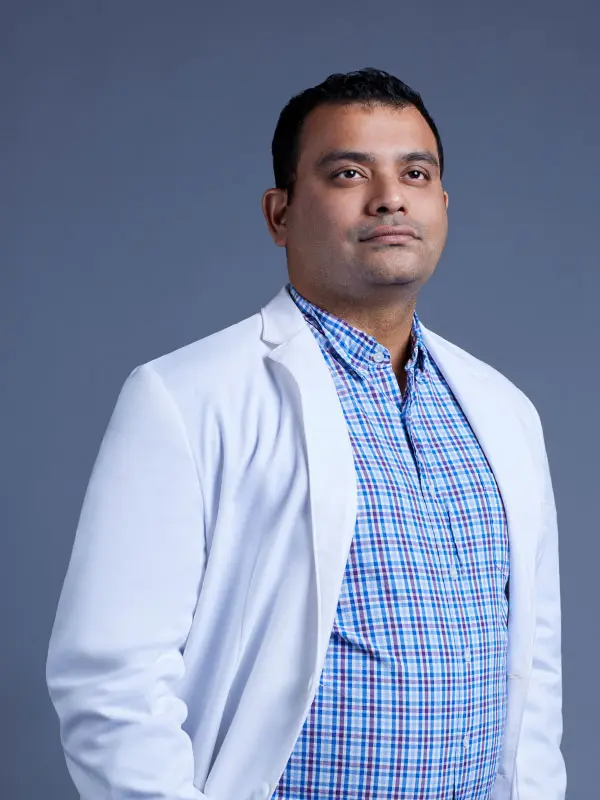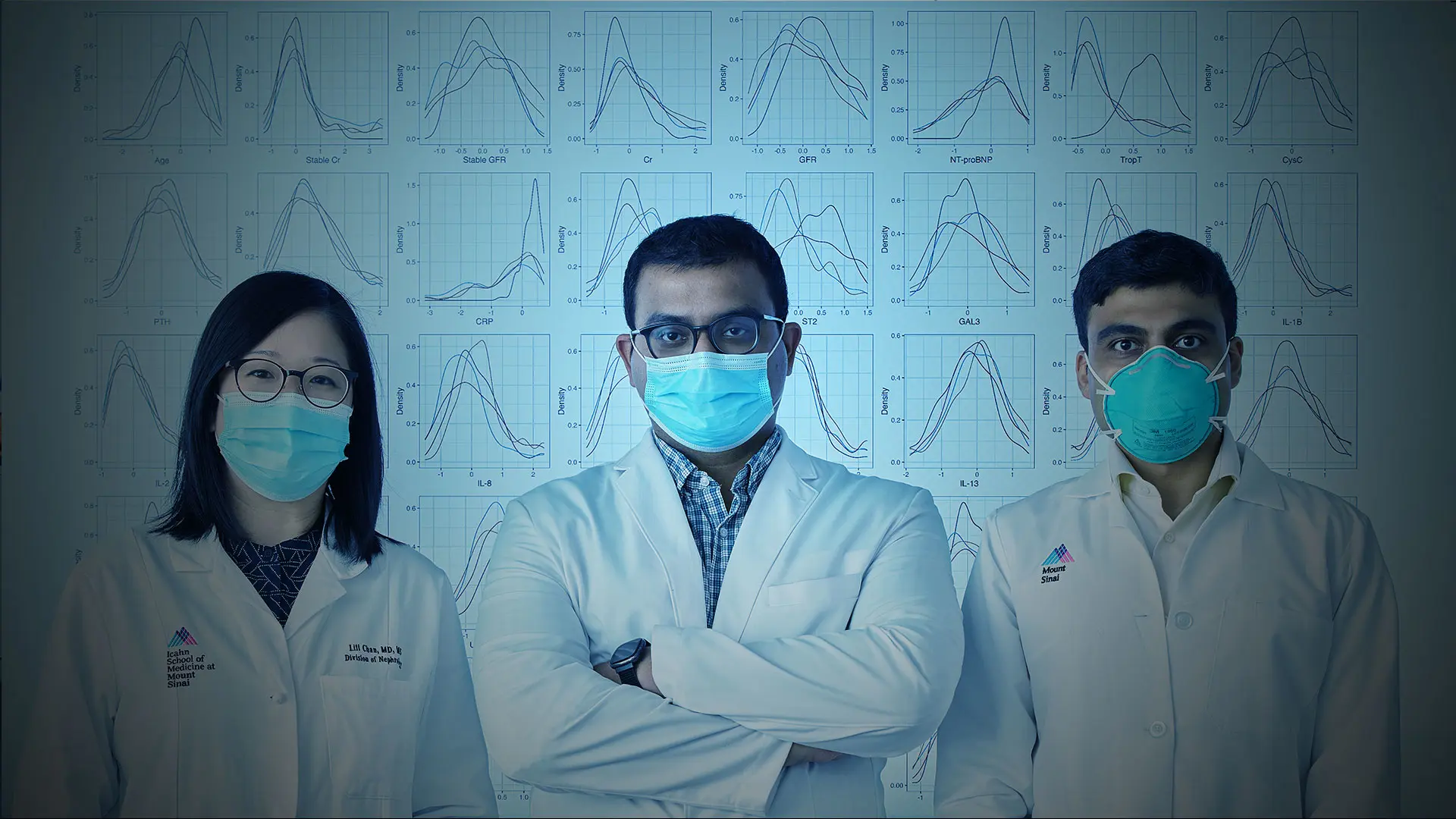When the COVID-19 pandemic hit New York City in early 2020, Girish N. Nadkarni, MD, and his Mount Sinai colleagues took the data they were gathering about the virus and combined it with several predictive models to create COVID-360. By aggregating and visualizing medical record information, risk factors, and predictive models, this new tool gave clinicians the rapid insights and predictions they needed for more effective management of patients who had contracted the disease.
The success of that initiative was a vital reminder that clinicians need not only ready access to data but also expertise on how to apply that data to impact patient care. “As medicine becomes increasingly data driven and advances into the digital age, all departments need a central hub dedicated to integrating data science and digital tools into clinical practice,” says Dr. Nadkarni, Irene and Dr. Arthur M. Fishberg Professor of Medicine at the Icahn School of Medicine at Mount Sinai. “Mount Sinai’s leadership decided that the Department of Medicine, which is instrumental to the care of every patient in the hospital, should have such a hub.”
The result is the Division of Data-Driven and Digital Medicine (D3M). Established in June 2021 within the Department of Medicine at Icahn Mount Sinai, it will augment and empower translational research and clinical care by promoting data science and digital health resources to clinicians who have ideas for improving health care but no clinical informatics background to see those ideas through.
“We aggregate, harmonize, and help them make sense of the data so they can develop patient care models; we validate those models to address issues such as biases; and we conduct rigorous testing through randomized trials to ensure that models perform as intended before they are implemented,” says Dr. Nadkarni, the division chief. “Essentially, we exist as a one-stop shop of data science insights for clinical care for the Department of Medicine.”
As one of the first divisions of its kind nationwide, it reinforces Mount Sinai’s reputation as a pioneer in data-driven medicine. “From the Mount Sinai Clinical Intelligence Center to BioMe®, the first large-scale biobank to be established by a hospital system nationwide, Mount Sinai has consistently been ahead of the curve in embracing data-driven and digital medicine,” says Dr. Nadkarni. “This division is a critical step forward for us in integrating data science and digital tools into clinical practice.”
A one-stop shop for data science insights for clinical care
The division is already making significant inroads in delivering on that mission through research collaborations across the department and with data-driven Icahn Mount Sinai entities such as the Hasso Plattner Institute for Digital Health, The Charles Bronfman Institute for Personalized Medicine, and the Clinical Intelligence Center (formerly the Mount Sinai COVID Informatics Center).
Several of those projects are focused on nephrology. The division conducted a prospective validation of a COVID-19-related acute kidney injury risk prediction model developed by Lili Chan, MD, Assistant Professor of Medicine (Nephrology), and postdoctoral fellow Akhil Vaid, MD, at Icahn Mount Sinai, which is helping physicians manage patients. It has partnered with Scott L. Friedman, MD, Dean for Therapeutic Discovery, and Professor of Medicine (Liver Diseases), and Pharmacological Sciences, and Meena Bansal, MD, Director of the NASH Center of Clinical Excellence and Professor of Medicine (Liver Diseases), on the development of a predictive algorithm for patients at risk of developing non-alcoholic fatty liver disease. It is exploring the chronic kidney disease landscape to identify opportunities for improved patient care. And it is collaborating with Ashwin Sawant, MD, Assistant Clinical Professor of Medicine (Hospital Medicine) at Icahn Mount Sinai, on the development and prospective validation of a new predictive model for patients at risk of developing antibiotic-resistant urinary tract infections.
“Typically, we err on the side of caution and administer broad-spectrum antibiotics because we are not sure if patients are presenting with antibiotic-resistant bacteria, but that is leading to more antibiotic resistance,” says Dr. Nadkarni, who also serves as Clinical Director of the Hasso Plattner Institute and Co-Director of the Clinical Intelligence Center. “By using machine learning, we can better determine which patients are likely to be resistant and limit the use of broad-spectrum antibiotics to them, and the results we are seeing from this project are promising.”
To facilitate these and other research projects, Dr. Nadkarni is building a dedicated team of data scientists for the division. That effort is being helped in part by access to graduates of Mount Sinai’s Master of Science in Biomedical Data Science program, but Dr. Nadkarni is also developing a clinical informatics training program to expose a new generation of medical students, residents, and fellows to the realm of data science and digital health. “Right now, there is no training pipeline to equip physicians with the skills to work with algorithms and augmented intelligence to improve patient care,” he notes. “We want to give residents and fellows that understanding so they can implement data science in their chosen fields and further revolutionize medicine.”
Ultimately, Dr. Nadkarni envisions that the division will have jointly appointed clinical informaticists across the Department of Medicine, and they will be developing clinically relevant use cases that advance patient care. “What we learn from the data we generate through that activity will help catalyze the evolution of the Department of Medicine into a learning department where data science and digital health are used to achieve better outcomes for our patients,” he says.
Featured

Girish N. Nadkarni, MD, MPH
Chair of the Windreich Department of Artificial Intelligence and Human Health, Director of the Hasso Plattner Institute for Digital Health, Chief AI Officer, Mount Sinai Health System

Lili Chan, MD
Assistant Professor of Medicine (Nephrology)
